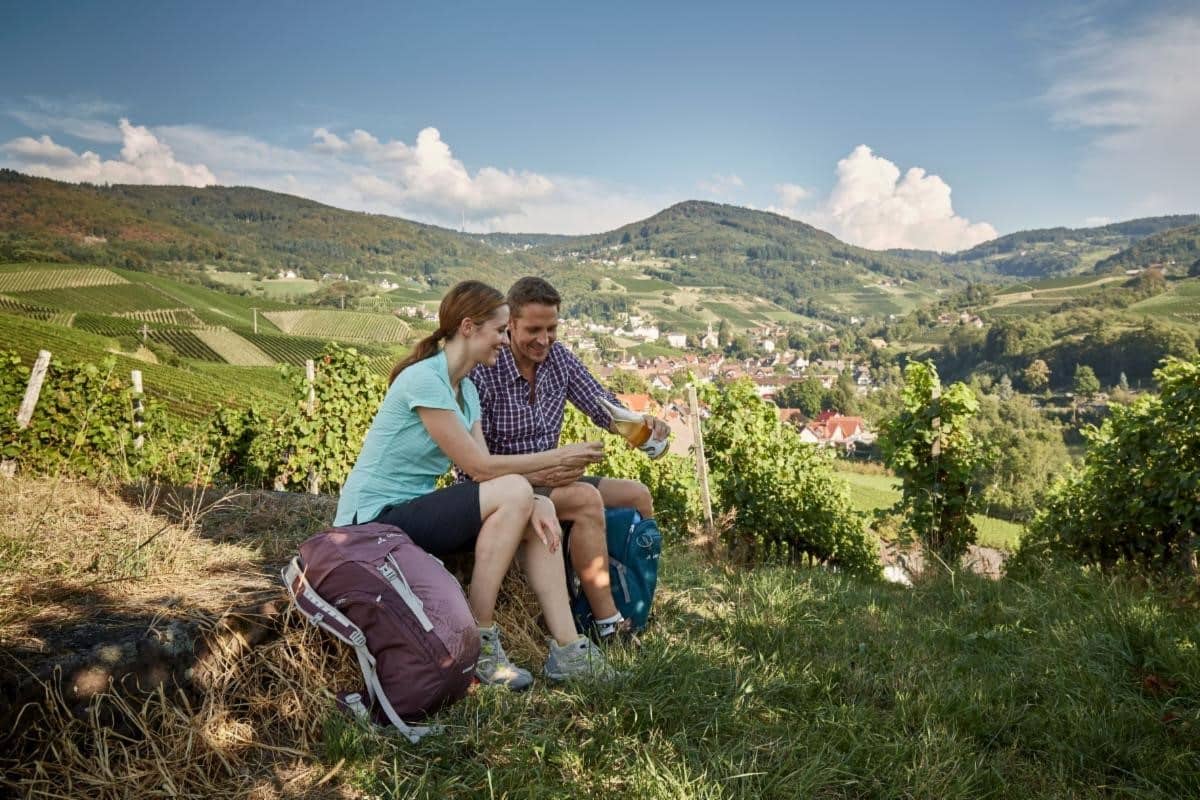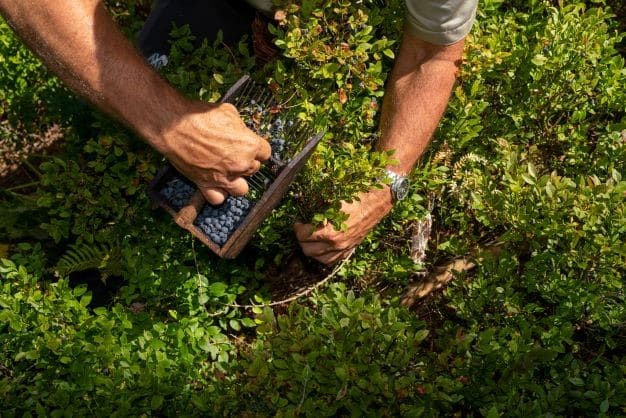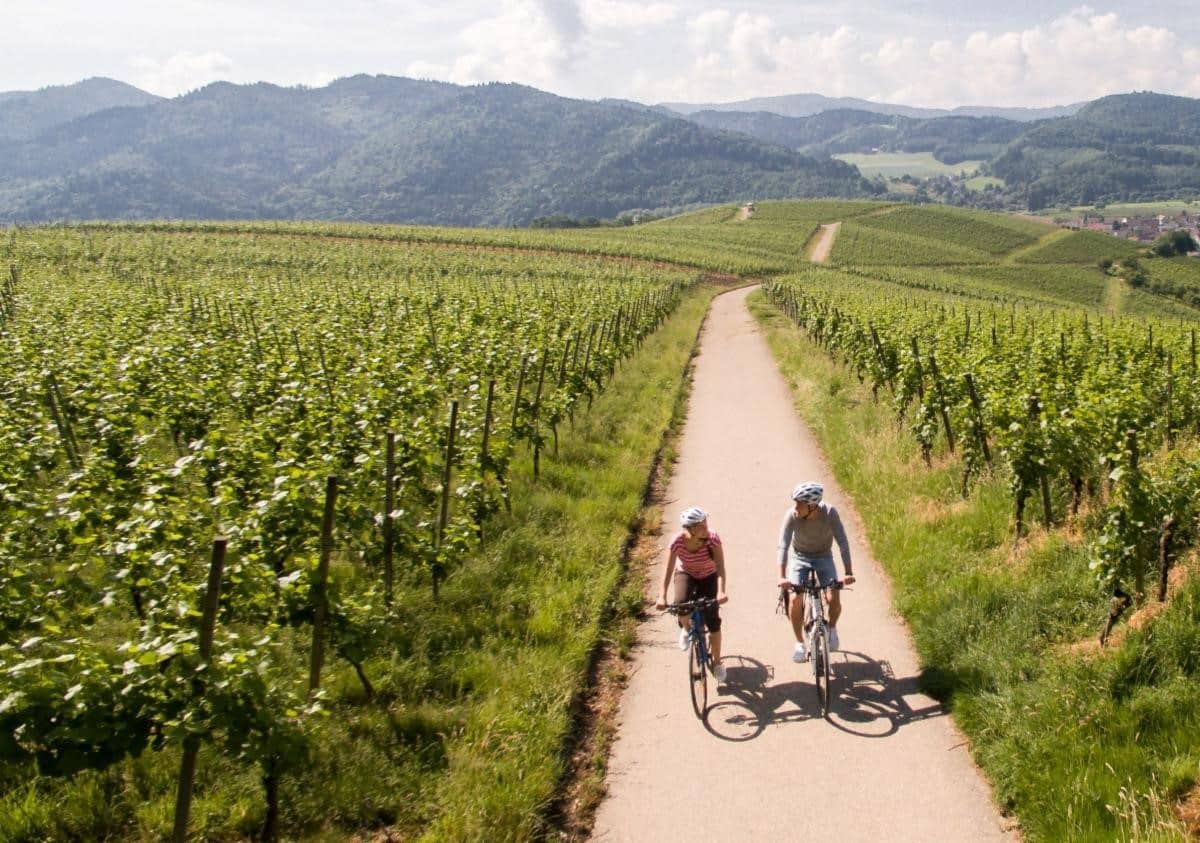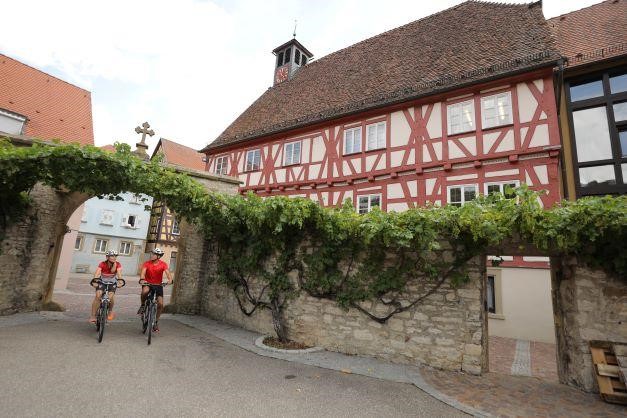Wine and Food Trails in SouthWest Germany

Baden-Württemberg is known as the home of many regional foods that are natural and sustainable, involve delicious recipes, and fun hiking and biking. We have several examples to share with you this month where you can go solo, as a couple or with a family or group.
The panoramic hops tour through orchards and fields above the village of Tettnang is a chance to learn about the hops growing process and to relax at the end with a really good beer and meal. The themed hiking trail around Enzklösterle, at the northern end of the Black Forest is about seven miles long and runs past many blueberry bushes throughout forests and fields.The “Badische Weinstrasse” (Baden Wine Route) snakes its way for over 300 miles through Baden’s most beautiful wine-growing regions and is perfect for a biking tour interspersed with delicious meals and wines and charming villages and castles.
The Württemberg Wine Trail is just as beautiful with its river landscapes, unique steep-slope vineyards, mild climate, winegrowing villages, world-famous art treasures in Stuttgart, excellent restaurants, cozy broom inns and modern wine shops. In the Black Forest Highlands, you will find the Zaepfle path in and around the Rothaus brewery where you will learn interesting information about the brewery’s history, fine beer, the unique Black Forest flora and fauna, and of course, the legendary spirit of the source, the delicious water. The Rothaus restaurant serves delicious traditional meals and has a hotel that is a perfect location for discovering the area. Please enjoy our active pursuit of good wine, delicious food, and our beautiful countryside.
The Blueberry Village of Enzklösterle
The idyllic blueberry village of Enzklösterle is located between Pforzheim and Freudenstadt in the northern Black Forest. The fir forests around Enzklösterle offer an ideal breeding ground and therefore the blueberries grow abundantly here and, at one time, helped to feed and secure the livelihood of entire families. From July 21 to 30, the entire village of Enzkloesterle celebrates their delicious blueberries. Everyone knows the Black Forest gateau but in Café Klösterle you can learn how the real Black Forest blueberry cake tastes. And then you decide for yourself which one tastes better to you. Also, have you ever heard of the “Wilde Heidi”? This is a cocktail created in Enzklösterle of blueberry liqueur, sparkling wine and wild blueberries. Her alcohol-free sister is the “Gentle Heidi.” They also create beautiful products and delicious spreads, including blueberry mustard, vinegar, jam “Gsälz,” spread, chocolate, teas, drinks, gift items and even table linens. Best of all, there is a delicious themed hiking trail around Enzklösterle, about seven miles long through the forests and vales past many blueberry bushes.
The Baden Wine Cycle Path through the Black Forest
The wine-growing country “Baden” on the western part of the Black Forest region is one of Germany’s largest wine-growing areas. The “Badische Weinstrasse” (Baden Wine Route) snakes its way for over 300 miles through Baden’s most beautiful wine-growing regions. It winds through picturesque wine-making villages, little half-timbered towns and vineyards between the Black Forest and the Rhine, in Southwest Germany. The “Badische Weinstrasse” is often known as “Baden’s gourmet route” thanks to its village inns and regional specialities, from asparagus to bacon. The “Baden Wine Cycle Path” connects the Baden wine regions for around 300 miles.
It begins in Grenzach on the German-Swiss border and continues over the Isteiner Klotz through the wine region Markgräflerland. Kaiserstuhl invite you to drive further north and explore the terraced vineyards. Alternatively, you can also choose the variant past Freiburg’s old town and the Glottertal. Cyclists come to Ortenau through the vineyards of the Breisgau. Passing Ortenberg Castle, the route continues in the direction of Karlsruhe and turns off into the Kraichgau near Bruchsal. Heidelberg is a real gem before the cycle path ends in Laudenbach on the “Badische Bergstrasse”. The route, which you can also do with an E-bike, covers approximately 1,000 feet in altitude and runs mostly on paved paths.
Insider Tip: Wuerttemberg Wine Cycle Path Offers Winding Roads,
Unique Vineyards
Dreamlike river landscapes, unique steep-slope vineyards, mild climate, idyllic winegrowing villages, world-famous art treasures, excellent restaurants, cozy broom inns (seasonal pop up wine taverns in summer and fall marked by a broom outside their doors) and modern wine shops invite you to discover the Württemberg Wine Trail. The best way to experience wine culture is by bike as the Württemberg Wine Cycle Path meanders over a total length of 250 miles. Traditional Württemberg grape varieties such as Trollinger, Lemberger or Riesling are reinterpreted by innovative young Württemberg winemakers. Along the cycle path there is always the opportunity to make personal acquaintance with these creative minds of the Württemberg wine scene and to taste their wines. The wines and winemakers have won many awards. Particularly impressive is the unique viticulture in terraces and steep slopes, which are cultivated by winegrowers in painstaking manual work and which characterize the Württemberg cultural landscape. On the route of the Württemberg Wine Cycle Path, you will find the town of Heilbronn, the oldest wine town in Württemberg, and the capital city of Stuttgart. Picturesque wine villages, characterized by half-timbered houses and viticulture, invite you to visit and linger. Wine museums and wine trails also provide information about the history and special features of Württemberg wine in numerous places.
Tettnang Hops Trail SouthWest Germany
Close to the Alps and Lake Constance, you will find the Tettnang Hops trail that will take you from farmer to brewer.
The Kronenbrauerei in Tettnang and the Tettnang Hops Museum in Siggenweiler mark the beginning and end of the four-kilometer Tettnang Hop Trail. Set against a backdrop of unspoiled countryside, winding through hop gardens and orchards, there are information boards at the edge of the path provide walkers and cyclists with an initiation into the secrets and features of hops cultivation and the art of brewing. Nestled between the northern shore of Lake Constance and the Allgäu region, Tettnang is a small town that was also the seat of the counts of Montfort and is Germany’s most southerly hops growing region.The unique landscape is particularly good for growing hops and there is a big focus on the environmental aspects of agriculture and hops farming. For over 175 years, hops have been grown and developed in the region. They come out only with a touch of bitterness which is exactly what master brewers from around the world value in aroma hops. Traditional hotels and restaurants before and after the path are destinations in themselves from the Gasthaus zur Krone to the Hotel Rad.
Rothaus Brewery in the Black Forest Highlands
Along the Zaepfle path in and around the Rothaus brewery in the Black Forest Highlands, you will learn interesting information about the brewery’s history, taste fine beer, explore the unique Black Forest flora and fauna, and see the legendary spirit of the source, the delicious water. Located in the middle of the Black Forest Highlands, the Zaepfle path leads through a beautiful landscape, and of course, includes the Rothaus Brewery. At a total of nine stations and three pavilions, a wealth of information is provided on the topics of raw materials from the region, how quality is created, and environmental methods and sustainability. are practiced. As a manufacturer of pure natural products, Rothaus has the greatest interest in preserving its environment and is committed to sustainable management. To that end, the company switched from heating oil to renewable energy in 2008 for the supply of thermal energy. It is currently the largest biomass heating system running in a brewery in Germany. In addition, Rothaus obtains 100% regional green electricity, which comes from the hydropower plants on the Upper Rhine. The brewery has optimized its use of state-of-the-art production facilities with high energy efficiency and optimized energy consumption in recent years. The meals are delicious and traditional, and the excellent restaurant is part of the hotel next to the brewery.
Learn more about SouthWest Germany
[related_post]Have your say Cancel reply
Subscribe/Login to Travel Mole Newsletter
Travel Mole Newsletter is a subscriber only travel trade news publication. If you are receiving this message, simply enter your email address to sign in or register if you are not. In order to display the B2B travel content that meets your business needs, we need to know who are and what are your business needs. ITR is free to our subscribers.




















TAP Air Portugal to operate 29 flights due to strike on December 11
Qatar Airways offers flexible payment options for European travellers
Airbnb eyes a loyalty program but details remain under wraps
Air Mauritius reduces frequencies to Europe and Asia for the holiday season
Major rail disruptions around and in Berlin until early 2026